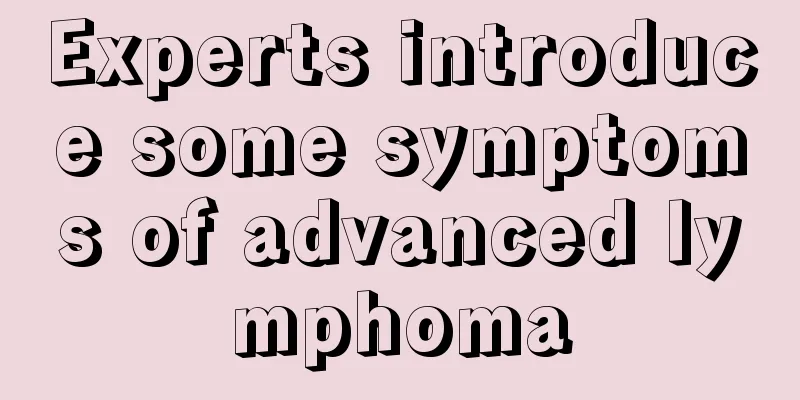How to detect nasopharyngeal carcinoma early and how to treat it well

|
Nasopharyngeal cancer is a disturbing disease. Patients are advised to choose a more formal hospital and not to blindly seek treatment. The following author introduces how to detect nasopharyngeal cancer early? How to treat it? How to detect nasopharyngeal cancer early? 1. The early bleeding symptoms of aspiration nosebleed are blood in the sputum after aspiration or blood in the nose after blowing. There is only a small amount of blood in the early sputum or runny nose, and sometimes there is no late bleeding. 2. Tinnitus, hearing loss, and a feeling of blockage in the ear. When nasopharyngeal carcinoma occurs in the lateral nasopharyngeal fossa or the upper lip of the Eustachian tube opening, the tumor compresses the Eustachian tube, which may cause unilateral tinnitus or hearing loss. It may also cause unilateral tinnitus or hearing loss caused by catarrhal otitis media. A feeling of blockage in the ear is one of the symptoms of early nasopharyngeal carcinoma. 3 Common symptoms of headache 68.6% can be the first symptom or. Symptoms Early headache location is not fixed intermittent late continuous migraine location is fixed Cause Early patients may be caused by neurovascular reflex or stimulation of the first trigeminal nerve terminal nerve, late patients are usually caused by intracranial tumor damage and cranial nerves 4 Diplopia Tumor invasion of the abducens nerve often leads to double vision and invasion of the trochlear nerve, resulting in inward strabismus and diplopia. In 6.2% to 19%, the trigeminal nerve is often damaged at the same time. How to treat it? The treatment of nasopharyngeal carcinoma includes radiotherapy, surgical treatment, chemotherapy, immunotherapy, etc. Radiotherapy is considered the first choice for the treatment of nasopharyngeal carcinoma. The vast majority of nasopharyngeal carcinomas are poorly differentiated squamous cell carcinomas, which are more sensitive to radiotherapy. Therapeutic radiotherapy can be used for early and mid-stage cases, and palliative radiotherapy can be appropriately combined with advanced cases. Chemotherapy has a certain short-term effect on nasopharyngeal carcinoma. Radiotherapy and chemotherapy are often used for patients in the middle and late stages, such as new adjuvant chemotherapy, radiotherapy and chemotherapy, and chemotherapy is mainly used for advanced cases with distant metastasis. Commonly used chemotherapy regimens include PF and CF5-FUDDP, with an effective rate of about 90%. Others include PFB, PMB, PFA, CBF, CAB and waiting regimens. Surgical treatment is only suitable for cases with insensitive high differentiation and residual or recurrent tumors after radiotherapy. |
<<: Treatment of Breast Cancer
>>: Can patients with nasopharyngeal cancer eat potatoes?
Recommend
Why is it that my butt bleeds but doesn't hurt?
The human body can actually develop different dis...
What is the reason why feet drag on the ground when walking
There are many different kinds of people around u...
Taboos about the death of an old man and a baby
In the eyes of many people, death is a very scary...
What does goosebumps mean
When people feel creepy or cold, goose bumps appe...
Only by choosing the right method can we treat melanoma patients
Recently, more and more people in my country are ...
Is the mortality rate of immune encephalitis high?
Immune encephalitis is a disease of the human imm...
Does walnut cause heaty food? Will eating walnuts cause internal heat?
Walnuts are very common nut foods and are often s...
What are the early symptoms of central jaw cancer
Central mandibular cancer is the only bone in the...
What symptoms does nasal septum polyp bring
When polyps appear in the nasal septum, they will...
Can the teratoma in the right accessory area be cured?
Right adnexal teratoma is currently a disease tha...
Can wild hops cure insomnia?
Nowadays, most people are in a sub-healthy state....
What are the fastest ways to solve constipation?
Nowadays, many people are suffering from constipa...
What to do if dumping syndrome occurs after gastric cancer surgery
Dumping syndrome refers to upper abdominal fullne...
Ovarian tumor causes ascites
Ovarian tumor causing ascites Patients with ovari...
What should you do if your stomach is indigestion? Have you done this?
Under the long-term influence of bad eating habit...









